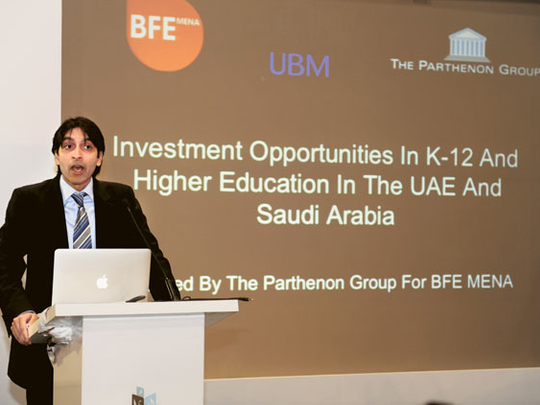
With more UAE residents showing a preference for the private sector in schools and higher education, investments opportunities are plentiful.
However, this trend should be an alarm bell for the public sector, which is losing Emirati students to the private sector.
The Parthenon Group's Regional Education Report, released at the Building Future Education Mena 2011 exhibition in Abu Dhabi recently, stated that Emirati parents prefer Western-branded higher educational institutions and international curricula at the school level.
"There is a clear trend in the region towards private education and a preference for international and mixed curriculum schools because students choose education in English at both secondary and tertiary levels," said Parthenon Group spokesman Karan Khemka.
Indian curriculum schools are also a lucrative investment opportunity with turnover at about $160 million (Dh587.60 million) per annum, said Khemka.
Public sector decline
Khemka said the private sector is currently doing a better job of serving the public "and I hope the public sector sits up and takes notice as it's very rare for people to move away from the public sector".
Khemka explained that it was odd for countries with positive demographics and income to have declining public sector enrolments.
"It is a perception of quality — private schools will offer better English and that's what parents are buying. Even in Saudi Arabia, private education is growing."
Also, private schools are accountable, Khemka said. "You are paying them money, you are the customer, so they have to care about you. Public schools will get funding whether you show up or not."
Dr Ayoub Kazim, managing director of Tecom Investments' Education Cluster, agreed that the findings should be an alarm bell for the public sector. "There have been many calls for educational reform and the government has taken many positive steps but there is a gap."
"Let's face it — students who graduate from high school are not meeting the expectations of the universities because they lack some skills," he said.
Kazim said the figure for Emiratis in private education was in the single-digit percentage 15 years ago but now more than 50 per cent are enrolled in private schools.
Although investors are usually excited about vocational training, Khemka advised against investment in the UAE.
"Vocational education is an industry that struggles in any country with a fast-growing labour supply."
He said in developing nations, there are few large private vocational training businesses because fast-growing labour market employers do not discriminate against uncertified employees. In fact, they prefer to hire and train in-house, said Khemka.
"I'm sad to say that the mindset we have here in the UAE is quite negative toward vocational education," said Kazim.
This perception needs to be changed and the Dubai and Abu Dhabi governments have taken steps to remedy the situation by having national institutions of technology and other initiatives, he said.












